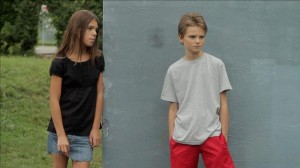Tomboy explores identity
Gender issues have become increasingly more prominent in the media.

Gender ambiguity · Laure (Zoé Héran, right) adopts the name and persona of Mikael, an identity with which she better relates, when she moves to a new town. Lisa (Jeanne Disson) welcomes Mikael into her friend group, but remains completely unaware of Mikael’s big secret. - Photo courtesy of Rocket Releasing
Tomboy, a film by director Céline Sciamma, explores just that — a 10-year-old girl’s feelings of confusion and sexual ambiguity in a typically French style.
In Tomboy, a French family with two daughters, 10-year-old Laure (Zoé Héran) and 6-year-old Jeanne (Malonn Lévana), moves to a new suburban neighborhood. With a boyish haircut and tomboy-ish demeanor, Laure passes herself off to the local kids as a boy under the name Mikael. The leader of the pack of children, Lisa (Jeanne Disson), becomes smitten with Mikael, the uniquely attractive boy.
Laure takes advantage of her new identity as Mikael — playing sports with the local boys, acting tough and even entertaining the idea of a girl being interested in her. The end of summer and the start of school promise an end to Laure’s dual identities.
Tomboy is a touching coming-of-age film, and Laure’s struggle to maintain her fake identity is moving and suspenseful. Viewers observe Laure as she struggles with various problems, such as trying to urinate like a boy and converting the feminine clothes her parents give her into more boyish articles. Laure even crafts a fake penis out of clay to put in her swimming trunks so she will look like a boy when swimming with friends. Moments like these show viewers how desperately Laure wants to fit in.
Héran acts her lead role perfectly, full of empathy. Héran gives us an incredibly natural-feeling performance. She is unassuming but still shows emotion through her face and body. Small, quiet moments provide insight into Laure’s character, such as when Lisa applies makeup to Laure’s face and tells her she would look great as a girl. As she digests these words, Laure is full of repressed emotion — sad, but also gripping. She also slumps in her seat with all the emotion of a child who doesn’t even know who she is.
Laure lives in a world full of confusion — about herself, her feelings and her environment. She is the new kid on the block, and it doesn’t help that her parents are distracted by the impending arrival of a new baby.
Thankfully, Laure’s charming and adorable sister, Jeanne, adds the right amount of comic relief and is the perfect complement to the angst-filled Laure.
With only a handful of scenes in the movie involving adults, a talented cast of kids helps make Tomboy feel raw and believable. The more emotionally intense scenes feel extremely realistic — the children talk minimally and awkwardly, and the conversations are full of uncomfortable silences. These scenes feel authentic and true to real adolescent life.
Adding to this feeling is the film’s style. A lack of a traditional film score and the use of carefully composed framing create an almost documentary-like clarity in the film, helping the scenes feel more natural. The cinematography in Tomboy is minimalist, utilizing many long takes and little dramatic cutting. This purposeful style seems to tell the audience to focus on the events and the characters, allowing viewers to almost forget they’re watching a film.
Laure has a desire to be accepted on her own terms. Tomboy never seems to judge Laure for her feelings, nor does it judge anyone else for their reactions to Laure — the events are presented for our interpretation, without much filmmaker bias. The minimalist filming style, naturalistic acting and the film’s closing support this interpretation.
Tomboy teaches us a lot about relationships — between children, children and their parents and between one’s own heart and body. The film is poignant and suspenseful, and almost everyone can relate to Laure’s desire for acceptance.
Additionally, Tomboy comes at a perfect time — a time when many gay and transgender youth are still struggling to gain acceptance. Childhood can be an especially cruel time, and to see Laure emerge from this crisis intact and accepted is heartwarming.
A contemporary and touching bildungsroman, Tomboy is a beautiful exploration of childhood ambiguity and a brilliant second production for director Céline Sciamma.
